sss.jpg)
THE DECEPTION PERPETRATED ON MUSLIMS IN INDIA
In the 11th century, the Indian subcontinent, which had a significant Muslim population, came into contact with Islam and was ruled by Muslim Turks for centuries. Starting from the late 17th century, the continent began to attract the appetite of European colonialists due to its potential for trade, gradually falling under British domination. In 1858, the last ruler, Bahadur Shah Zafar, was dethroned and exiled, marking the complete colonization of India by the British. It was a land rich in wealth, often referred to as the "jewel in the crown" of the British Empire. When we speak of India, it also includes present-day Pakistan, Bangladesh, Myanmar (Burma), and Nepal.
The 1857 uprising against British imperialism was brutally suppressed. The spark of the rebellion was ignited by the violation of Hindu caste customs regarding the boarding of ships by Indian soldiers. Additionally, the cartridges provided to Indian troops were rumored to be greased with beef tallow and lard, which had to be bitten off before use, and this was seen as offensive to both Hindus and Muslims. For political expediency, the British shifted the blame for the rebellion onto Muslims.
.jpg)
British Indians
British rule introduced new dynamics to the complex Indian society. Young Indians who were educated in newly established schools and universities, some even studying in England, began to adopt British lifestyles and ways of thinking. They found employment in government positions and pursued careers as lawyers, journalists, and teachers.
This led to a reaction among conservative masses. The Indian National Congress, founded in 1885 in Bombay with the majority of its participants being Hindu, issued an ultimatum to the British government. The movement, which London initially did not take seriously, grew in strength. Lord Curzon's oppressive governance further strengthened and radicalized the Congress Party. Economic boycotts also shook British rule. In 1906, the demand for independence was voiced, and in response to the Indian National Congress, Muslims formed the All India Muslim League.
In order to prevent losing the continent, England adopted a more conciliatory policy. Some political rights were granted to the people. As a result, when the call to join World War I emerged, the Indian National Congress responded positively, while Muslims loyal to the caliphate remained hesitant. One million Indian soldiers were sent to the war, and 100,000 of them lost their lives or became disabled. The Khilafat Movement opposed the British stance towards the Ottoman Caliphate. This led to a shift in British policy in Anatolia in favor of the Ankara movement, which was opposed to the Ottoman Sultanate.
Divide and Rule!
The British government, in an attempt to suppress rising nationalism, established special councils and cabinets in India with a majority of elected members. The Indian National Congress opposed this move. In 1920, Mahatma Gandhi initiated a nationwide civil disobedience movement called Satyagraha. He called for the boycott of British goods, schools, courts, titles, taxes, and elections. This call received significant support. Gandhi was not a fanatical Hindu. He, in fact sought to involve Muslims whom he felt close to in this movement, but Muhammed Ali Jinnah opposed it.
Gandhi was arrested and imprisoned in 1922. Jawaharlal Nehru took over the leadership. He advocated for a central dominion status with a bicameral parliament. Jinnah, who favored a loose federation with autonomy granted to the provinces, opposed this stance influenced by Aga Khan III.
In 1931, Gandhi reached an agreement with the British for the release of political prisoners. However, Nehru, this time, parted ways with the Congress and formed the Socialist Party. England, which disrupted the alliance between Hindus and Muslims and divided Hindus as well, announced that the system of separate elections for all religious/ethnic/social minorities would be preserved under the "Divide and Rule" policy. In 1935, the Government of India Act granted autonomous governance rights to each province. The Congress Party won elections in every province, while the Muslim League failed to secure a majority anywhere.
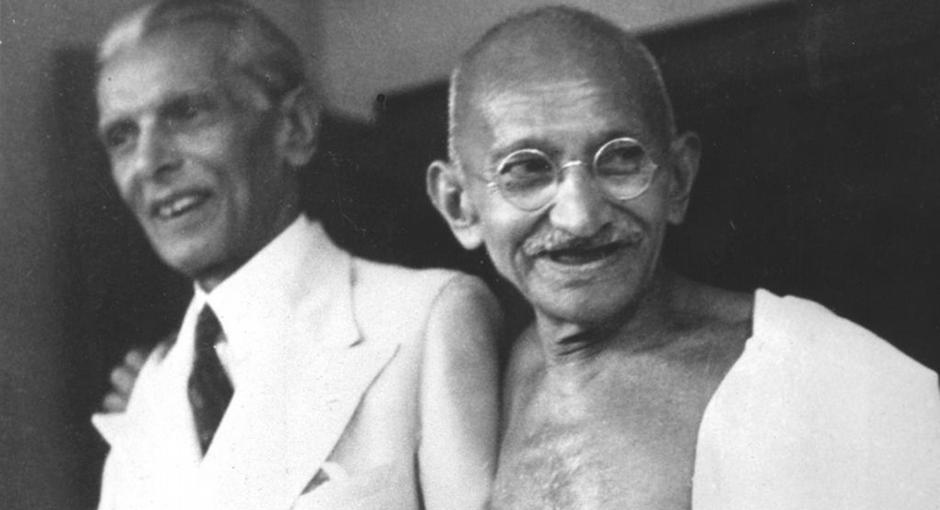
Gandhi and Jinnah
Quit India!
During World War II, Gandhi opposed the British with the slogan "Quit India!" He advocated for a referendum to determine whether Muslims desired a separate state. The Labour Party, which won the elections in Britain, promised independence to India. As a result, British rule in the subcontinent continued until 1947.
As a result of the pressures from the United Nations (i.e. the new dominant power of the world, the USA), Britain, despite winning the war even with significant losses, was compelled to grant independence to most of its colonies. As was customary for British imperialism, even in its departure, it sought to leave behind individuals it had trained, thus preserving the most advantageous status for itself.
In the 1946 elections, the Congress Party and the Muslim League emerged as the two major powers. The Congress Party obtained a majority in the Indian legislature, while all the seats reserved for Muslims were won by the Muslim League. Muslims were able to form local administrations only in Sindh and Bengal. Britain proposed the division of provinces based on Muslim or Hindu majority, but both sides refused to accept it. The demonstrations organized by Jinnah turned into horrific violence, resulting in loss of life. In Kolkata (Calcutta), 4,000 people were killed in just three days. The Congress Party made concessions to prevent further internal conflict.
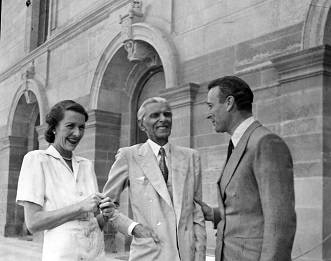
Jinnah with the Lord Mountbatten family
The Lion's Share to the Hindus
The late queen's husband, the Duke of Edinburgh, had a relative named Lord Mountbatten who served as the last Viceroy of India. He managed to convince both sides to accept the proposal for the partition of the country. It was decided that the provinces under the control of the Congress Party would remain with the Hindus, while referendums would be held in Sindh, Baluchistan, Northwest India, Punjab, and Bengal, where the Muslim League had the majority. As a result, on August 15, 1947, two separate states were established: India and Pakistan.
It was not as simple as it seemed. Indeed, the division of assets, separation of civil services, drawing of borders in Punjab and Bengal, and determining the position of around 600 autonomous states were complex issues that needed to be addressed. For this purpose, a commission was established. India, which had the majority of the natural resources and investments, benefited more from this division. The Muslims were left with poorer regions.
The departure of civil servants from their regions was left to their personal choice. The determination of borders proved to be much more difficult. The rulers of all the autonomous states, most of which had Muslim majorities, lost their thrones. The issue of Kashmir, which was given to Hindus but had a Muslim majority, led to bloody conflicts between the two states and remains a source of dispute even today (due to British policy).
The most painful aspect was the emergence of the largest refugee problem in history. Around 18 million refugees were displaced from both sides. During the resulting conflicts, 200,000 people lost their lives. In 1971, East Pakistan (now Bangladesh) separated, leading to the displacement of 10 million people as refugees.
.jpg)
Mr. Jinnah
Muhammad Ali Jinnah (1876-1948) was the son of a wealthy merchant from the Ismaili sect, which is an extremist branch of Shia Islam. He received his education in England and became a lawyer. In 1896, he returned to his homeland and practiced law in Bombay. Over time, he gained great fame and reputation. He married the daughter of a wealthy Zoroastrian millionaire from Bombay. He had a deep admiration for British political institutions and held liberal and democratic views. He advocated for the creation of a common national consciousness among the people of India. For him, the interest of India, rather than the interests of Muslims, was the primary concern. As a result, he joined the Indian National Congress and entered politics. However, as the Muslims formed a separate league and gained strength, he shifted his political stance. He aspired to become the leader of Muslims and rejected Gandhi's perspective on the Indian issue. He opposed passive resistance and rejected the idea of a united India where Hindus and Muslims would live together.
Muslims accused him of embracing nationalism. Desperate on the grounds that the Indian National Congress was excluding Muslims, Jinnah went to England in 1930. He returned five years later, and something had changed within him. Emerging as the leader of the growing independence movement among Muslims, he formed the All India Muslim League, which decided to pursue the creation of a separate Muslim state. While publicly supporting the idea of a united India, Britain secretly backed Jinnah and hindered Gandhi's efforts. Jinnah masterfully executed his political strategy, leading both Britain and the Indian National Congress to accept the idea of partition. Jinnah became the leader of the new state called Pakistan, comprising Punjab, Afghania, Kashmir, and Sindh.
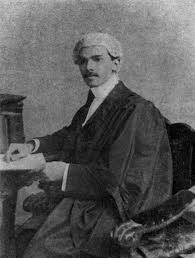
Jinnah as a lawyer
Jinnah was calm and rational. He played the game according to his own rules. He was very polite and dressed like British aristocrats. He had a European-like personality and was often referred to as Mr. Jinnah. He was not fluent in his mother tongue; thus, he primarily spoke in English. He did not emphasize his sect and described himself simply as a Muslim due to his position. Despite not leading an Islamic lifestyle, he declared that the religion of the new state would be Islam, but avoided taking concrete steps in this regard. He never had a strong Islamic cause. Today, Pakistan is an independent country but faces numerous problems. Meanwhile, Muslims in India are being suppressed by the Hindu government, overshadowed by their former glorious days.
Jinnah personally stated that the person who had the most influence on his character and political ideology was Atatürk, and for this reason, the Pakistani Parliament bestowed upon him the title of "Quaid-e-Azam" (the Great Leader). During a speech, Liaquat Ali Khan applauded him as "The Atatürk of our state." Despite the fact that a majority of national heroes were imprisoned, exiled, or even sentenced to death for political reasons, the Muslims were so naive and helpless that Jinnah managed to become a national hero without the need for any of them.
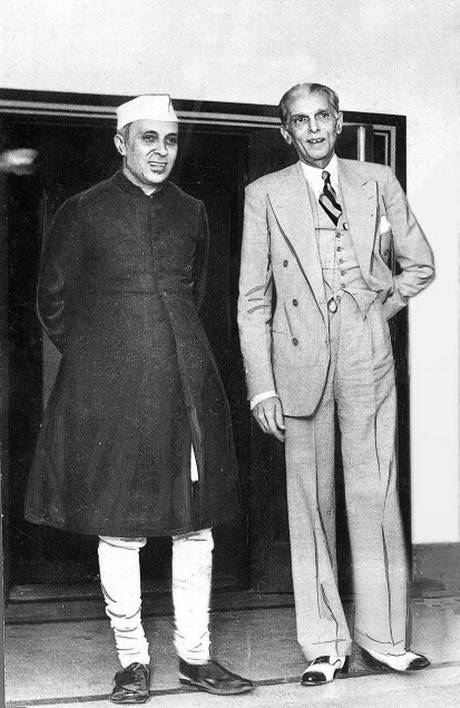
Jinnah and Jawaharlal Nehru
Half-naked Fakir
Mahatma Gandhi, whom Churchill referred to as the "half-naked fakir," studied law in London, much like Jinnah. He practiced law in Bombay. In his youth, he volunteered in the Boer War and even formed an Indian brigade for the British. His ideological framework took shape in South Africa, where he fought against racism. From 1919 onwards, he opposed British rule and organized the Congress Party. When passive resistance turned into a mass movement, he was sentenced to six years in prison.
In order to abolish the caste system, Gandhi retired from politics in 1934 and settled in a village. He returned to politics after World War II and fought for a united India. The partition of India disappointed him. In 1948, he was assassinated by a Hindu extremist. He played a significant role in the dissolution of the British Empire. Despite being a mediator and reconciler, he faced hostility from various factions.
Gandhi's philosophy was centered around appearing poor and opposing technology. He idealized the simplicity of the spinning wheel and plow. He portrayed himself as a self-sacrificing, naive and passive politician who suffered in the name of humanity. This can actually be seen as a social project, as people tend to respect those who live a simple life. However, some view this lifestyle as a conscious performance, as many individuals derive pleasure from it.
When Churchill learned that Gandhi was consuming orange juice and applying nourishing oils to his body during his hunger strike, he remarked in the Parliament, "It is apparently not a fast merely a change of diet." Gandhi was regarded by the British with a mix of admiration, anger, mockery, and suspicion. In commemoration of Gandhi's 100th birth anniversary in 1969, a statue was erected in his honor in London. He became a symbol of peaceful, enlightened, and liberal politics. While Gandhi always opposed the partition, India's first and longest serving Prime Minister Nehru agreed to it, allowing him to remain at the helm of India until his death. Indira Gandhi was the daughter of Nehru.
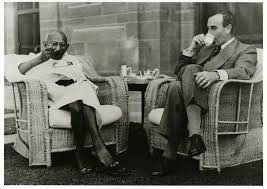
Gandhi and Lord Mountbatten
Önceki Yazılar
-
“FASTING WAS MADE OBLIGATORY ALSO UPON THOSE BEFORE YOU”25.02.2026
-
WHAT WAS THE LAW OF THE OTTOMAN EMPIRE?18.02.2026
-
WOMAN IN THE EASTERN WORLD11.02.2026
-
THE OTTOMAN DYNASTY OWES ITS LIFE TO A WOMAN4.02.2026
-
THE WATER OF IMMORTALITY IN THE “LAND OF DARKNESS”28.01.2026
-
THE WORLD LEARNED WHAT FORBEARANCE IS FROM SULTAN MEHMED II21.01.2026
-
THE RUSH FOR GOLD14.01.2026
-
TRACES OF ISLAM IN CONSTANTINOPOLIS7.01.2026
-
WHO CAN FORGIVE THE KILLER?31.12.2025
-
WHEN WAS PROPHET ISA (JESUS) BORN?24.12.2025